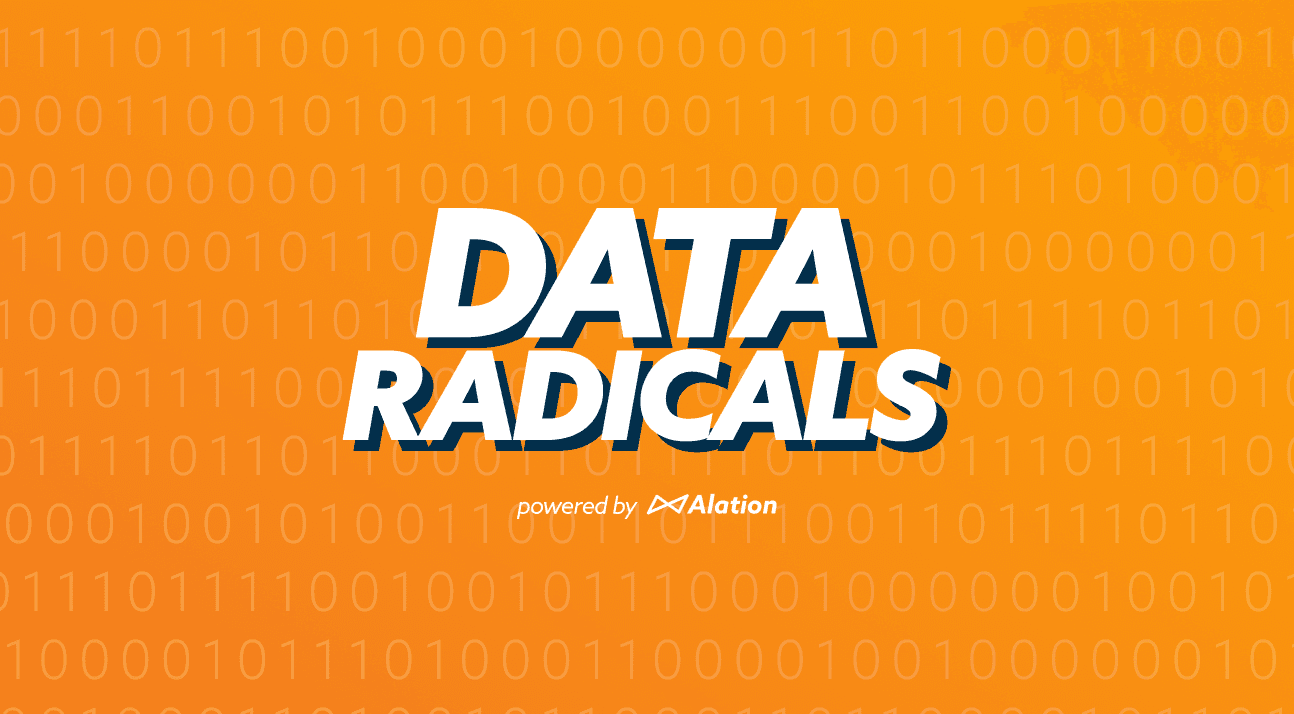Data Leadership & AI: Insights from Top DataIQ 100 Leaders

By Hannah Tarabishi
Published on April 3, 2024

Alation’s revAlation conference, which took place in London, Chicago, and Sydney October 2023, attracted data leaders to explore what’s next in data intelligence. A compelling session at the U.K. stop featured the top three in the DataIQ 100 list discussing AI, how to enable a data culture in today’s fast-moving world, and getting the business engaged with a data strategy.
Here’s a recap of that conversation.
A trifecta of DataIQ 100 leaders
The DataIQ 100 is the first and only fully-curated power list of the most influential data and analytics practitioners. It’s a veritable who’s who of chief data officers, chief analytics officers, data scientists, data governance experts, and leaders from related solution and service providers.
At revAlation, we were lucky to have a panel consisting of the top three finalists, all hailing from Alation customers! Sanjeevan Bala from ITV, Loretta Franks from Kellanova, and Steve Pimblett from The Very Group were joined by David Reed, Chief Knowledge Officer and Data Evangelist at DataIQ as panel moderator. These panelists placed first, second, and third, respectively, on the 2023 DataIQ 100, with Bala being named “the most influential person in data” for the year.
Adding AI to the data culture conversation
Reed first asked the panelists about balancing value against trust when enabling a data-driven organization and in the face of the explosive influence AI is having on today’s data conversations. While business leaders look for value and rank-and-file workers fear for their jobs, data leaders are being thrust into the middle of those conversations.
“Stakeholder engagement is key,” says Pimblett, Chief Data Officer at The Very Group, a multi-brand online retailer and financial services provider. “We brought our key stakeholders in to show how other retailers are using AI to educate them and get them excited. We’re also using a data literacy program and getting people to pilot AI tools. It’s very much a top-down and bottom-up approach.”
For Franks, VP, Chief Data & Analytics Officer at Kellanova, a global leader in snacking, cereal, noodles, and plant-based foods, trust has become a large part of the technology and data equation. That’s not a new phenomenon only related to AI. But, it again revolves around the people aspect more than the technological, says Franks.
“There is a big trust and people element to how we navigate AI. I like to look at this from the people lens versus the application lens. Getting the foundation in place is brilliant, but [it won’t work] if you cannot get your people moving with you. Increasing that level of trust is a huge enabler.”
Bala, Group Chief Data & AI Officer at ITV, a British television network, echoed the need to focus on people and trust, and also consider the business benefits and risks, especially for those leading the organization.
“When new technologies come out, the first question is, ‘Does this pose an existential threat to the business or does this create a huge opportunity for us?’,” Bala asks. “These are the polarizing ends of the debate at the board level.”
Adapting data strategies in a constantly changing environment
Of course, AI won’t be the last innovation to promise so much value while causing so much disruption. It’s merely the latest. Yet no matter the technology, data is at the epicenter of change. New technologies create more data in new formats covering new attributes while other technologies make it easier to find, track, organize, and analyze data in more and easier ways.
For data and analytics leaders, the resulting whiplash effect can be disorienting. But, the panel advises others to focus on the value while not losing sight of the risks, and always considering who you’re working with and their perspectives on data, risk, and business value.
“There’s definitely a balance,” says Pimblett. “You’re always balancing data as an asset and data as a liability.”
Franks adds “Every day is so different [so] you’ve got to adapt to the role you’re in. [Chief data officers] are more about leadership and the ability to drive change and interact and engage with multiple business functions.”
Bala agrees, saying the chief data officer or chief analytics officer, and even his role as chief AI officer, force one to “be a chameleon” and “walk in the shoes of the stakeholder.”
Hitting the data culture jackpot with business context
Understanding the needs of the business then becomes a natural outcome of understanding stakeholders’ perspectives. As a creative entertainment producer and distributor, ITV doesn’t naturally take to data, Bala points out. So, he works to merge his teams with the business so they can learn the business context of every data need.
“Data scientists are in huge demand right now, but business context is going to be much more important to drive outcomes than the unicorns that you’re trying to hire and recruit,” Bala continues. “All of your technology and [data scientists] are going to be useless if you can’t understand the context of the business. The more you empower data teams with business context and understanding, the better the quality of the ideas.”
That merging of business and data seems obvious, but even these “most influential people in data” continue to put it into practice.
“We keep talking about the data community and the business community,” says Franks. “We’re going to hit the jackpot when that is not discussed and the function you’re aligned to is completely irrelevant. [The goal] is just a collective team of people solving business objectives.“
How Alation benefits the most influential people in data
To wrap up the discussion, Reed asked the panel about their use of Alation and where it’s providing value. The panel shared three key takeaways for driving success with a data intelligence platform:
Prove the value to the business. Bala lauded Alation for focusing on the customer relationship as well as the technology, but also drilled down on ITV’s key challenges and how they could be solved. Alation helped the company identify unused data that could be removed from its cloud infrastructure to save money. “That created a pull from the business rather than a push from [the data team]. When you have a business leader speaking about the tool and talking about the business benefits it’s generating, that drives further adoption around the organization.”
Tie the value to a key initiative. Franks used Alation to identify data sources and lineage during a strategic corporate divestiture. “We massively benefited from Alation from a lineage perspective because we had to do a full assessment as part of our spinoff. It became a critical tool for us. Now "[we are] on a journey to really unlock [the value].”
Extend the value beyond the initial impact. As a consumer retail company, The Very Group is highly focused on risk mitigation and its use of personally identifiable information (PII), says Pimblett. Touting Alation’s effectiveness in helping those efforts then strengthened trust in the solution and the data. “We bought Alation through a risk lens, but then quickly moved into vertical adoption. In one case, we found that the business had different ways to measure visitor metrics across different teams. Alation helped us centralize that data.”
To learn more about revAlation 2023, read this recap and watch the keynotes.
- A trifecta of DataIQ 100 leaders
- Adding AI to the data culture conversation
- Adapting data strategies in a constantly changing environment
- Hitting the data culture jackpot with business context
- How Alation benefits the most influential people in data








